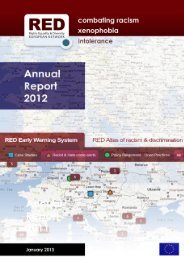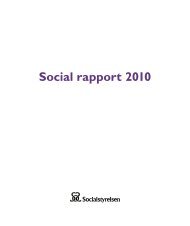R48PITFALLS AND BIASCompulsory schooling in Hungary begins at <strong>the</strong> earliest at <strong>the</strong> age <strong>of</strong> six <strong>and</strong> at <strong>the</strong> latest at <strong>the</strong> age <strong>of</strong> eight(Article 6.2). Kindergarten is <strong>the</strong> first year <strong>of</strong> compulsory schooling, but a child may attend at <strong>the</strong> age <strong>of</strong> five.A medical clearance is required to enroll in kindergarten, but a school readiness examination is not a requirementfor enrollment. Once a child enters school, if <strong>the</strong> head teacher notices that a child might be having difficultyperforming, <strong>the</strong> teacher may refer a child to <strong>the</strong> Educational Counseling Service to assess <strong>the</strong> child’s readiness forschool, particularly if <strong>the</strong> child has not attended kindergarten before <strong>the</strong> age <strong>of</strong> compulsory schooling (Act onPublic Education, Article 6.4.a <strong>and</strong> Decree 14/1994, §22.4). On <strong>the</strong> basis <strong>of</strong> a preliminary examination, <strong>the</strong> EducationalCounseling Service establishes that a child has special educational needs or struggles with “adaptive, learning,or behavioral difficulties” <strong>and</strong> prepares an expert opinion on school enrollment for a child (Article 35.4). In addition,<strong>the</strong> Educational Counseling Service refers a child to <strong>the</strong> Rehabilitation Committee for testing (Act on PublicEducation, Article 30.8). Throughout <strong>the</strong> assessment process, <strong>the</strong> teachers engage in continuous monitoring <strong>of</strong><strong>the</strong> child, through observations <strong>and</strong> assessment, <strong>and</strong> prepare a report for <strong>the</strong> Rehabilitation Committee to assistin <strong>the</strong>ir assessment (Decree 14/1994, §13.6–9). Once <strong>the</strong> Rehabilitation Committee performs medical, pedagogical,<strong>and</strong> psychological assessments on <strong>the</strong> child <strong>and</strong> determines that <strong>the</strong> child has a disabling condition, <strong>the</strong>Rehabilitation Committee <strong>the</strong>n transfers <strong>the</strong> responsibility for <strong>the</strong> child to <strong>the</strong> Educational Counseling Service,which provides pedagogical, psychological, developmental, <strong>and</strong> <strong>the</strong>rapeutic supports, support for educators,<strong>and</strong> facilitates communications with families. Based on <strong>the</strong> findings <strong>of</strong> <strong>the</strong> Educational Counseling Service <strong>and</strong> <strong>the</strong>Rehabilitation Committee, ei<strong>the</strong>r entity can recommend that <strong>the</strong> child remain in kindergarten for an additionalyear (Act on Public Education, Article 24.5).Ano<strong>the</strong>r recommendation that <strong>the</strong> Educational Counseling Service <strong>and</strong> Rehabilitation Committee can make isfor a child determined to have special educational needs to be allowed to enter <strong>the</strong> first grade as a “preparatoryyear” as set out in Article 70 <strong>of</strong> <strong>the</strong> Act on Public Education. In this year, <strong>the</strong> child attends <strong>the</strong> first grade, but isexempted from class evaluation <strong>and</strong> assessment <strong>and</strong> an “individual development plan” must be prepared (Act onPublic Education, Article 30.9). 13 Required for all pupils with special educational needs, <strong>the</strong> individual developmentplan is prepared by <strong>the</strong> special education teacher or <strong>the</strong>rapist <strong>and</strong> should include, depending on <strong>the</strong> child’s disablingcondition, items related to intellectual, hearing, vision, motor or physical, speech, or psychological development(Decree 14/1994, §8.6). For children attending <strong>the</strong> preparatory year, advancement to <strong>the</strong> next grade dependson recommendations by <strong>the</strong> teacher <strong>and</strong> <strong>the</strong> Educational Counseling Service <strong>and</strong>/or Rehabilitation Committee,with <strong>the</strong> individual development plan specifying academic areas in which <strong>the</strong> pupil should catch up with his orher classmates by <strong>the</strong> end <strong>of</strong> grade four (Act on Public Education, Article 70.9).13 The “individual development plan” is similar to what is termed in o<strong>the</strong>r countries’ legislation as <strong>the</strong> “individualized education plan,”“individualized education program,” or “statement <strong>of</strong> special needs.”
R49Parents are also involved in <strong>the</strong> assessment process, as a child cannot be assessed without <strong>the</strong> consent <strong>of</strong> <strong>the</strong>parents or legal guardians. Decree 14/1994 requires that parents regularly — although “regularly” is not defined —receive detailed information about <strong>the</strong>ir child’s development <strong>and</strong> progress (§14.1.b.). Under Article 13.8 <strong>of</strong> <strong>the</strong>Act on Public Education, parents have <strong>the</strong> right to appeal decisions made by <strong>the</strong> Rehabilitation Committee <strong>and</strong>Educational Counseling Service; this same article confers on parents <strong>the</strong> responsibility to accompany <strong>the</strong>ir childto <strong>the</strong> Educational Counseling Service sessions to ensure that <strong>the</strong> child participates in school psychologicalassessments, if so recommended. The public administration <strong>of</strong>ficer is also given <strong>the</strong> right to compel parents to meet<strong>the</strong> obligations set out for <strong>the</strong>m in this section <strong>of</strong> <strong>the</strong> law in <strong>the</strong> best interests <strong>of</strong> <strong>the</strong> child. This is reinforced inArticle 30.4, whereby <strong>the</strong> public administration <strong>of</strong>ficer “may compel <strong>the</strong> parents to appear at an expert examinationwith <strong>the</strong>ir child in <strong>the</strong> interest <strong>of</strong> <strong>the</strong> children/pupils or to enroll <strong>the</strong>ir child at an appropriate educational-teachinginstitution on <strong>the</strong> basis <strong>of</strong> <strong>the</strong> expert opinion.” So, while parents purportedly have a choice <strong>of</strong> where to enroll<strong>the</strong>ir child, <strong>the</strong>ir choices are limited by <strong>the</strong> basis <strong>of</strong> <strong>the</strong> expert opinions <strong>of</strong>fered. Additionally, while parental consentis required by law before assessment <strong>and</strong> placement can take place, <strong>the</strong> parental responsibilities can be forcedor parental rights can be waived if a public administration <strong>of</strong>ficer finds it is in <strong>the</strong> best interest <strong>of</strong> <strong>the</strong> child to beassessed or to be placed in a particular educational setting. 14Hungarian legislation includes provisions for reassessment. Decree 14/1994 m<strong>and</strong>ates that <strong>the</strong> RehabilitationCommittee carry out a yearly review <strong>of</strong> <strong>the</strong> child’s assessments until <strong>the</strong> child reaches eight years <strong>of</strong> age, afterwhich a triennial review is required (§9.4). In <strong>the</strong> case where children are diagnosed with mild mental h<strong>and</strong>icap, <strong>the</strong>Rehabilitation Committee reviews its decision one year after determination, <strong>the</strong>n every o<strong>the</strong>r year until <strong>the</strong> childreaches 12 years <strong>of</strong> age; after that, <strong>the</strong> Rehabilitation Committee conducts triennial reviews (Decree 14/1994, §20.4).Hungary is characterized by a lack <strong>of</strong> coordination in <strong>the</strong> area <strong>of</strong> psychological diagnostics (Bohács <strong>and</strong> Tóth 2008;Lányiné <strong>and</strong> Nagyé 2008, 13; Csépe 2009). There is no nationwide system <strong>of</strong> diagnostic protocol, which impactspr<strong>of</strong>essional development <strong>and</strong> assessment procedures. This lack <strong>of</strong> a national system also impacts <strong>the</strong> au<strong>the</strong>nticity<strong>and</strong> validity <strong>of</strong> <strong>the</strong> testing instruments, <strong>and</strong> <strong>the</strong>re is documentation <strong>of</strong> diagnosticians not following proceduresset out in <strong>the</strong> administration manual, using outdated instruments, <strong>and</strong>/or using unlicensed (illegal) copies <strong>of</strong>tests that have been brought into Hungary from abroad <strong>and</strong> poorly translated into Hungarian (Csépe 2009, 162).The Hungarian Psychological Association’s Test Committee only recently was involved in <strong>the</strong> Hungarianst<strong>and</strong>ardization <strong>of</strong> <strong>the</strong> WISC-IV <strong>and</strong> provides free training <strong>and</strong> legal test protocols to Rehabilitation Committees14 Similarly, <strong>the</strong> United States’ Individuals with Disabilities Education Improvement Act includes provisions for parental rights, includingthat a parent must provide written consent before a child can be evaluated for eligibility for special education services. However, underSection §614(a)(1)(D)(ii)(II) <strong>of</strong> this law, if a parent does not consent to initial evaluation, <strong>the</strong> school has <strong>the</strong> right to pursue <strong>the</strong> evaluation,if this is allowed by <strong>the</strong> state in which <strong>the</strong> parents reside (Education is not constitutionally m<strong>and</strong>ated in <strong>the</strong> United States; it is under <strong>the</strong>purview <strong>of</strong> <strong>the</strong> individual states). On <strong>the</strong> o<strong>the</strong>r h<strong>and</strong>, <strong>the</strong> school or state does not have <strong>the</strong> right to provide special education serviceswithout <strong>the</strong> consent <strong>of</strong> <strong>the</strong> parent.
- Page 3 and 4: R3CONTENTSACKNOWLEDGMENTS 4EXECUTIV
- Page 5 and 6: R5EXECUTIVE SUMMARYThis policy pape
- Page 7: R7For Romani children in Central an
- Page 10 and 11: R10PITFALLS AND BIAS4. Discontinue
- Page 12 and 13: R12PITFALLS AND BIASINTRODUCTIONThe
- Page 14 and 15: R14PITFALLS AND BIASa child is read
- Page 16 and 17: R16PITFALLS AND BIASthe child (Ryan
- Page 18 and 19: R18PITFALLS AND BIASTABLE 2. Placem
- Page 20 and 21: R20PITFALLS AND BIASAMONG THE ROOTS
- Page 22 and 23: R22PITFALLS AND BIASTAXONOMY OF “
- Page 24 and 25: R24PITFALLS AND BIASdevelop the ver
- Page 26 and 27: R26PITFALLS AND BIAS2008, 136). Ard
- Page 28 and 29: R28PITFALLS AND BIASBias in test ad
- Page 30 and 31: R30PITFALLS AND BIASWhile the test
- Page 32 and 33: R32PITFALLS AND BIASOF ROMANI CHILD
- Page 34 and 35: R34PITFALLS AND BIAStwo distinct ty
- Page 36 and 37: R36PITFALLS AND BIASPOLICY AND PRAC
- Page 38 and 39: R38PITFALLS AND BIASand had to repe
- Page 40 and 41: R40PITFALLS AND BIASOrientation Tes
- Page 42 and 43: R42PITFALLS AND BIASTABLE 5. Educat
- Page 44 and 45: R44PITFALLS AND BIASCOUNTRY-SPECIFI
- Page 46 and 47: R46PITFALLS AND BIASPLACEMENT IN SP
- Page 50 and 51: R50PITFALLS AND BIASand Educational
- Page 52 and 53: R52PITFALLS AND BIAS121.1.cc.ii). A
- Page 54 and 55: R54PITFALLS AND BIASTest of School
- Page 56 and 57: R56PITFALLS AND BIASof the overall
- Page 58 and 59: R58PITFALLS AND BIASAS WITH OTHER C
- Page 60 and 61: R60PITFALLS AND BIASfirst grade, or
- Page 62 and 63: R62PITFALLS AND BIASbases listed in
- Page 64 and 65: R64PITFALLS AND BIASof Societies in
- Page 66 and 67: R66PITFALLS AND BIASTABLE 13. Pupil
- Page 68 and 69: R68PITFALLS AND BIASROMANI CHILDREN
- Page 70 and 71: R70PITFALLS AND BIASdetermined to c
- Page 72 and 73: R72PITFALLS AND BIASdeveloped in th
- Page 74 and 75: R74PITFALLS AND BIASWechsler Intell
- Page 76 and 77: R76PITFALLS AND BIAStheir chances t
- Page 78 and 79: R78PITFALLS AND BIASREPRESENTATION
- Page 80 and 81: R80PITFALLS AND BIASTABLE 20.Enroll
- Page 82 and 83: R82PITFALLS AND BIAS
- Page 84 and 85: R84PITFALLS AND BIASGOOD PRACTICE A
- Page 86 and 87: R86PITFALLS AND BIASStudent assessm
- Page 88 and 89: R88PITFALLS AND BIASThe United King
- Page 90 and 91: R90PITFALLS AND BIASor assistance i
- Page 92 and 93: R92PITFALLS AND BIASTeachers report
- Page 94 and 95: R94PITFALLS AND BIASTHE DETERMINATI
- Page 96 and 97: R96PITFALLS AND BIASintellectual di
- Page 98 and 99:
R98PITFALLS AND BIAS8. Ensure that
- Page 100 and 101:
R100PITFALLS AND BIASANNEX 1:RELIAB
- Page 102 and 103:
R102PITFALLS AND BIAS1. Does the te
- Page 104 and 105:
R104PITFALLS AND BIASANNEX 2:COMPON
- Page 106 and 107:
R106PITFALLS AND BIASFIGURE A4. Sam
- Page 108 and 109:
R108PITFALLS AND BIASAshton-Warner,
- Page 110 and 111:
R110PITFALLS AND BIASCahn, Claude,
- Page 112 and 113:
R112PITFALLS AND BIASD.H. and Other
- Page 114 and 115:
R114PITFALLS AND BIASFigueroa, Rich
- Page 116 and 117:
R116PITFALLS AND BIASGovernment of
- Page 118 and 119:
R118PITFALLS AND BIASHayman, Robert
- Page 120 and 121:
R120PITFALLS AND BIASKovács-Cerovi
- Page 122 and 123:
R122PITFALLS AND BIASMacura-Milovan
- Page 124 and 125:
R124PITFALLS AND BIASMoore, Tom. 20
- Page 126 and 127:
R126PITFALLS AND BIASRadivojevic, D
- Page 128 and 129:
R128PITFALLS AND BIASShepard, Lorri
- Page 130 and 131:
R130PITFALLS AND BIASTomatová, Jan
- Page 132 and 133:
R132PITFALLS AND BIASVláda Česká
- Page 134:
Copyright © 2012 Roma Education Fu




